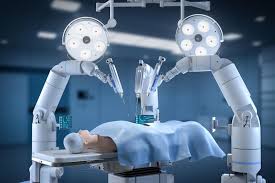18 April 2025 | Friday | Reports

Intuitive , a global leader in minimally invasive care and the pioneer of robotic-assisted surgery (RAS), announced the publication of two studies showing how the availability of RAS helps enable access to high-quality care, improve patient outcomes, particularly in medical deserts, and contributes to the overall growth of minimally invasive care ultimately benefitting patients.
The studies, published in the Journal of the Society of Laparoscopic & Robotic Surgeons and Annals of Surgery Open, are part of broader research underway by Intuitive to evaluate the availability and impact of RAS. As a leader in minimally invasive care, Intuitive is committed to identifying gaps in patient access and collaborating with healthcare providers to help them expand access and measure outcomes through evidence generation.
Minimally Invasive Surgery Deserts: Is There a Role for Robotic Assisted Surgery?
The first study, titled “Minimally Invasive Surgery Deserts: Is There a Role for Robotic Assisted Surgery?” identified regions where patients lack access to high-quality MIS due to factors such as training availability, location, and/or hospital infrastructure. The study also examined how RAS can enable more widespread and efficient adoption of minimally invasive care.
“Minimally invasive surgery offers profound benefits for patients, from shorter recovery times to reduced postoperative complications, yet too many patients lack access due to barriers like surgeon training or hospital location,” said Intuitive’s Chief Medical Officer Myriam Curet, M.D. “This paper underscores the need for innovative solutions to give hospitals and surgeons more options to improve patient care and outcomes.”
Key findings from this article, authored by a multidisciplinary team including Intuitive, include:
Rates of Minimally Invasive Surgery after Introduction of Robotic-Assisted Surgery for Common General Surgery Operations
Building on the previous study, “Rates of Minimally Invasive Surgery after Introduction of Robotic-Assisted Surgery for Common General Surgery Operations,” examined how the introduction of RAS has influenced rates of MIS in hospitals across the United States. The study also evaluated whether adopting RAS helped expand access to MIS across different demographics, including age, sex, race, ethnicity, and insurance status.
The study evaluated data from 408 U.S. hospitals between 2016 and 2022, focusing specifically on 153 hospitals that introduced RAS for common general surgeries such as cholecystectomy, hernia repair, and colorectal resection. The findings highlight the broader impact of RAS adoption on minimally invasive surgery rates:
Prior studies have debated whether the rise of RAS primarily shifts procedures from laparoscopy rather than expanding MIS access. This research adds to the body of evidence suggesting that, in many hospitals, the introduction of RAS contributes to overall MIS growth across populations rather than redistributing surgical methods by overcoming some of the barriers associated with laparoscopy, including ergonomic limitations and 2D visualization.
“These findings suggest that the introduction of robotic-assisted surgery is helping to expand patient access to minimally invasive techniques,” said Zhi Ven Fong, MD, MPH, DrPH, co-author, hepatobiliary and pancreas surgeon, and surgical oncologist, Division of Surgical Oncology and Endocrine Surgery, Mayo Clinic Arizona. “By removing some of the technical challenges of traditional laparoscopy, RAS has the potential to make minimally invasive surgery a more viable option for a broader range of patients.”
To date, more than 16 million patients have benefitted from minimally invasive care performed with Intuitive technologies including urology, gynecology, colorectal, general surgery, thoracic, and cardiac surgery procedures and has helped improve patient outcomes, ranging from shorter recovery times to reduced postoperative complications, depending on the procedure and individual patient characteristics.
© 2026 Biopharma Boardroom. All Rights Reserved.